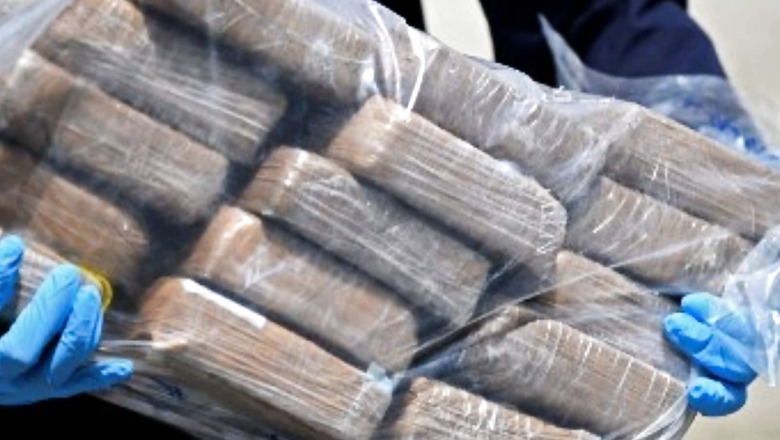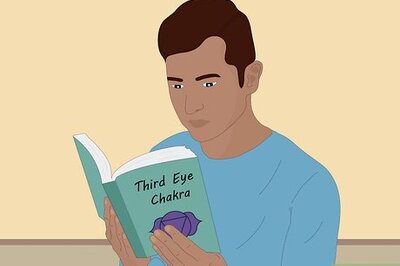
views
To make India drug-free, police from all states and anti-drug agencies often carry out raids at several locations in the country based on inputs. During such raids, a huge or small amount of drugs are seized by the cops and then samples are taken to an analysis by the forensic science laboratory. In the last few days, the cops in Bengaluru and Mumbai have seized different types of drugs, including hydroponic weeds, cocaine, and hashish. However, when such drugs are seized, people often get curious to know: How do the police destroy these illegal drugs?
Here’s how Bengaluru Police dispose off the seized drugs:
Until 2018, the Bengaluru Police used to burn such seized substances, on court’s order, in an open space near those police stations that conducted raids. However, burning drugs in huge quantity is now against the NDPS Act. Hence, a committee of Karnataka State Pollution Control Board officials and the Deputy Commissioner of Police (Crime-1) as the nodal officer was formed to ensure disposal of drugs in environment-friendly manner.
What Happens to Seized Substances?
The Department of Revenue under the Union Finance Ministry had in 2015 passed an order to all state governments stating that seized drugs must be destroyed as earliest as possible in order to avoid its misuse or theft. “There have been many instances where small quantities of drugs have gone missing from places where they were stored. Hence, once the drugs are seized and samples are sent for testing to the forensic lab, we have to destroy it,” The News Minute quoted a senior police official as saying.
The seized drugs are kept in a corner room of a building near the Bengaluru Police Commissionerate’s office. Once the drugs are seized, probe team takes photographs and make videos for evidence purpose which is then submitted to a magistrate, who orders the disposal of these banned substances. “We can’t destroy drugs without a court order and even the 2015 government order requires a magistrate’s approval,” the official told The News Minute.
How Drugs Are Destroyed?
In its 2015 order, the central government asked all state governments to form a Drug Disposal Committee consisting an officer with the rank of – Superintendent of Police, the Joint Commissioner of Customs and Central Excise and Joint Director of Directorate of Revenue Intelligence along with PCB officials – to ensure that the process of disposal is not compromising with the norms of the Pollution Control Board.
However, the drugs can be disposed only in those cases where the total amount in possession weighs a certain prescribed amount.
A senior officer, who was formerly the Bengaluru Police Commissioner told TNM, that NDPS Act allows to auction synthetic drugs to drug firms if they can be recycled.
“In 2018, with the help of the Karnataka State Pollution Control Board, we identified a factory in Magadi, where drugs are disposed of in incinerators. These are boilers with temperatures of 1,000 degrees and the drugs are disposed of safely. The NDPS Act allows us to auction synthetic drugs to drug companies if they can be recycled but we have not done that due to fear of misuse,” he said.
“If it is ganja or hashish or hash oil, which weigh 100 gm or 200 gm, then it is burned in an empty plot. Generally it is done late in the night when people are not around. Smaller quantities of synthetic drugs are stored and once there is enough to incinerate, it is disposed of in a timely manner,” the officer told TNM.
Here is the current definition of a small quantity of some drugs:
1. Amphetamine: 2 grams
2. Charas: 100 grams
3. Cocaine: 2 grams
4. Ganja: 1 kilogram
5. Heroin: 5 grams
6. LSD: 2 milligrams
7. Methadone: 2 grams
8. Morphine: 5 grams
9. Opium: 25 grams
What is NDPS Act?
The Government of India enacted the Narcotic Drugs and Psychotropic Substances Act, or NDPS Act, to control addictive drugs and prohibit their possession, dispersion, sale, import, and trade in the country.
The bill was introduced in the Lok Sabha on 23 August 1985. It was passed by both the Houses of Parliament, received assent from then President Giani Zail Singh on 16 September 1985, and came into force on 14 November 1985. The NDPS Act has since been amended four times — in 1989, 2001, 2014 and 2016.
The Act extends to the whole of India and it applies also to all Indian citizens outside India and to all persons on ships and aircraft registered in India.
For the unversed, the Narcotics Control Bureau (NCB) on Saturday evening conducted raids on the cruise ship off the coast of Mumbai and busted a drug party. Some high-profile passengers were arrested in connection with the case. Based on a tip-off that a party was scheduled on the ship, an NCB team, led by its zonal director Sameer Wankhede, had raided the Goa-bound Cordelia cruise ship and recovered drugs from some of the passengers.
“During the operation, the suspects were searched and different drugs were recovered from them, which they had hidden in their clothes, undergarments and purses (by women). The detained persons will be produced in a court later in the day after the legal formalities get over,” the NCB official said.
Read all the Latest News , Breaking News and IPL 2022 Live Updates here.



















Comments
0 comment